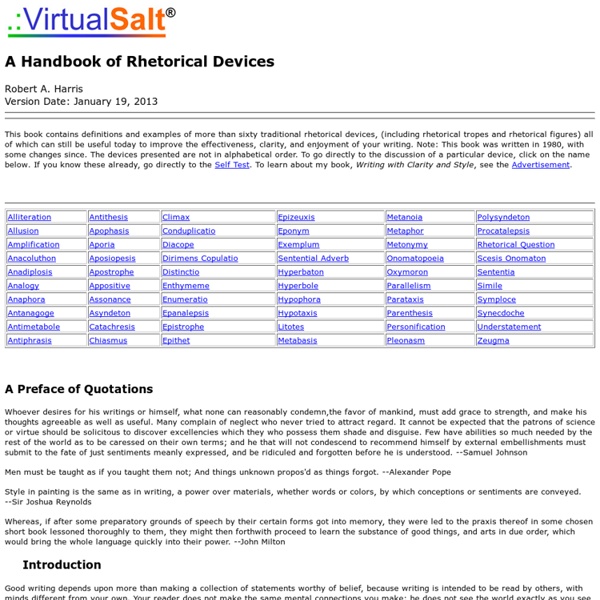Fifty Writing Tools: Quick List
Use this quick list of Writing Tools as a handy reference. Copy it and keep it in your wallet or journal, or near your desk or keyboard. Share it and add to it. I.
Top 5 Books That Will Change How You Think!
Self education is vastly underrated! I came across this concept back in my early twenties, and got curious. I figured out that there was nothing that was stopping me more from learning apart from me. And the good news is that when you begin to use self-education to your advantage, you learn on your terms. There are many benefits to self education.
Drafting Legal Documents, Principles of Clear Writing
Home | Previous | Next Principles of Clear Writing 1.
New York Times 50 Most Challenging Words (defined and used)
The New York Times recently published a list of 50 fancy words that most frequently stump their readership. They are able to measure this data thanks to a nifty in-page lookup mechanism, which you can try here. Try double-clicking the word “epicenter”. Since the NYT didn’t include definitions of these words, I decided to post a job to MediaPiston to produce an article defining and using each word in the list. Voila! Just a few hours later, here it is.
How to Make Sentences Clear and Concise
How to Make Sentences Clear and Concise ( printable version here ) Richard Lanham, a professor of English at UCLA, invented an easy-to-use method for making your writing clearer and more concise. The Writing Center strongly advocates Lanham's "Paramedic Method" for your writing. Here's how to do it: 1a.
Liberalism is socialism, and socialism is big government
Myth: Liberalism is socialism, and socialism is big government. Fact: Liberals believe in private ownership of the means of production; socialists, public. Summary
Undergraduate Writing Center
In concise writing words pull their own weight. Each carries meaning essential to the content of the sentence. Try to identify which words add meaning to the sentence and which just take up space. As you revise your work, keep these enemies of concision in mind.
23 Psychological Life Hacks to get an Advantage
Have you always wondered about the subtle things you can do to totally improve the outcome of a situation? It is something that I have constantly been thinking about. After spending some time searching up on the subject I came across some incredible bits of advice from a reddit discussion. From this, I’ve pulled out and organized users’ top advice on how to improve your outcomes. 23 psychological Life Hacks to get a Situational advantage.
Logical Fallacies and the Art of Debate
Contents: Introduction This is a guide to using logical fallacies in debate. And when I say "using," I don't mean just pointing them out when opposing debaters commit them -- I mean deliberately committing them oneself, or finding ways to transform fallacious arguments into perfectly good ones. Debate is, fortunately or not, an exercise in persuasion, wit, and rhetoric, not just logic. In a debate format that limits each debater's speaking time, it is simply not reasonable to expect every proposition or conclusion to follow precisely and rigorously from a clear set of premises stated at the outset.
10 counter culture novels that will get you high on life
From the European Romantics of the 18th century avant-garde to the pre-WWI Bohemians, the world’s been struck by many a powerful counter-cultural movement. The one that’s closest to our hearts, though, spanned the mid-twentieth century, and was rooted in the USA: from the post-War 1940s right though to the early days of the 1970s, America was bombarded with hippies, flower-power, drop-outs, squatters, pacifist campaigners and (not least) feminists, each of them battling against the status-quo and the staid, conservative middle-classes. And what helped to stir this revolutionary stew? Why, books, of course!
Creative Writing Prompts
Many creative writers use prompts to generate new material. Prompts can be challenges -- for example, write a story using only one syllable words or craft an alphabet story where the first sentence begins with the letter A, the next sentence B, and so on -- or themes provided by journals, or a poem to which an writer can respond. For example, the Sun lists prompts and deadlines every issue. To see responses, check out "Readers Write." For a list of up-to-date journal prompts, deadlines, and contest information, see the Writing Program's bulletin board in Jensen on the second floor.



